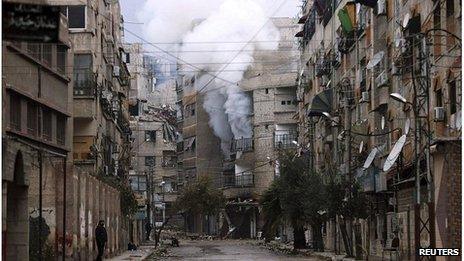Syria capital Damascus sees heavy Jobar fighting
- Published

Fierce fighting broke out in the Syrian capital, Damascus, as rebels attacked forces loyal to President Bashar al-Assad, witnesses and rebels said.
Much of the violence was centred around the Jobar district and a key junction on the Damascus ring road.
But it was not clear whether the rebels managed to retain any territory they claimed in battle, and the Syrian army said it too launched an offensive.
Earlier, reports said bombings in the town of Palmyra killed 19 people.
The violence in both Damascus and Palmyra came as the head of the main Syrian opposition alliance, Moaz al-Khatib, said his offer of talks with the government would be withdrawn unless women prisoners were released by Sunday.
Mr Khatib, who heads the National Coalition, has seen his surprise offer of peace talks backed by the US, UN and the Arab League.
But it has been ignored so far by the Assad government in Damascus.
"Women must be released by the coming Sunday," he told BBC Arabic. "If any woman stays in prison, I consider the regime not responding."
More than 60,000 people are estimated to have been killed in the 22-month conflict between the Assad government and rebel groups.
The UN says it fears continuing violence could destabilise the whole region.
More than 600,000 Syrians have fled into neighbouring countries to escape the violence, the UN refugee agency says.
Key to the city
In Damascus, Wednesday's fighting was reported to be some of the heaviest in months.
Rebel fighters tried to seize positions on the eastern approaches to the city centre, with government forces replying with heavy bombardments.
"We have moved the battle to Jobar," Capt Islam Alloush of the rebel Islam Brigade told Reuters news agency.
"The heaviest fighting is taking place in Jobar because it is the key to the heart of Damascus," he added.
Rebel strongholds in the south of the city are currently cut off from central Damascus, and the outbreak of fighting was reportedly centred around a strategic road junction on the city's ring road.
Activists reported that heavy government mortar fire was still hitting areas around the eastern edge of the city well after nightfall, the BBC's Jim Muir reports from Beirut, Lebanon.
But while rebels said they had made significant gains, including in Jobar, government officials insisted pro-Assad forces were pushing back.
One security official quoted by the AFP news agency said the army had launched a "co-ordinated all-out offensive" in areas surrounding Damascus.
"Our noble army is continuing its operations against the terrorists in Irbeen, Zamalka and Harasta and Sbeineh, destroying the criminal lairs," Syrian TV said.
Activists admitted at least 13 rebels had been killed in fighting, our correspondent says.
Oasis bombing
Away from Damascus, twin bomb blasts were reported in the central town of Palmyra.
The official Sana news agency said the attack took place in a residential area, about 220km (140 miles) north-east of Damascus.
One activist group said a military intelligence building had been targeted and that at least 19 members of the security forces had died.
The first bomber reportedly blew up his explosives-laden car next to back a wall of the military intelligence compound in the town. The second assailant is then said to have driven through the hole, detonating the bomb inside his vehicle and destroying parts of the facility.
Video footage purportedly showed a cloud of smoke rising from the town.
Situated at an oasis in the Syrian desert, Palmyra is known across the world as the home of the monumental ruins of a great Roman-era city that was one of the most important cultural cities of the ancient world.
It is also the location of an infamous jail where thousands of people were allegedly detained, tortured and executed after a Muslim Brotherhood uprising against the late President Hafez al-Assad in the 1980s.